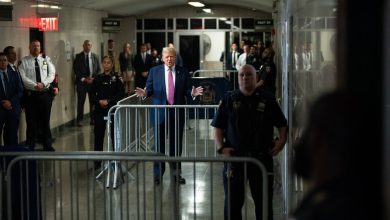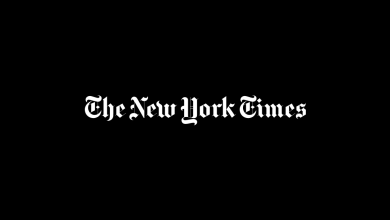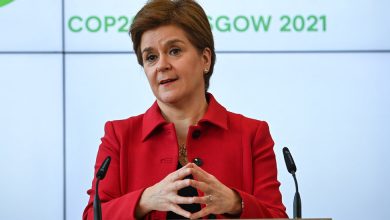Global Economic Forecasts Are Dropping Fast

WASHINGTON — The world economy has entered a period of intense uncertainty as a capricious pandemic and the fallout from Russia’s war in Ukraine are fueling inflation and weighing on an already fragile global recovery.
These colliding challenges are confronting policymakers and central bankers in the United States and Europe as they seek to bring down inflation without slowing growth so much that they tip their economies into recession. In the last week, international organizations and think tanks have begun slashing their forecasts for growth and trade as they assess the war’s disruptions to global energy, food and commodity supplies, as well as China’s sweeping lockdowns to contain a renewed coronavirus outbreak.
The pall over the world economy was underscored on Tuesday by the International Monetary Fund, which said in its World Economic Outlook that global output was expected to slow this year to 3.6 percent, from 6.1 percent in 2021. That is a downgrade from a January forecast of 4.4 percent growth this year.
“Global economic prospects have been severely set back, largely because of Russia’s invasion of Ukraine,” Pierre-Olivier Gourinchas, the I.M.F.’s chief economist, wrote in a blog post accompanying the report. “This crisis unfolds even as the global economy has not yet fully recovered from the pandemic.”
The economic concernsare a central topic for policymakers convening in Washington this week for the spring meetings of the International Monetary Fund and the World Bank.
Mr. Gourinchas said the war was slowing growth and spurring inflation, which he described as a “clear and present danger” for many countries. He added that disruptions to Russian supplies of oil, gas and metals, along with Ukrainian exports of wheat and corn, will ripple through commodities markets and across the global economy “like seismic waves.”
But he acknowledged that the trajectory of the global economy would depend on how the war proceeded and the ultimate breadth of the sanctions that the United States and its allies in Europe and Asia imposed on Russia.
“Uncertainty around these projections is considerable, well beyond the usual range,” Mr. Gourinchas said. “Growth could slow down further while inflation could exceed our projections if, for instance, sanctions extend to Russian energy exports.”
Rising prices around the world show no signs of abating, the I.M.F. said, even if supply chain problems ease. It expects inflation to remain elevated throughout the year, projecting it at 5.7 percent in advanced economies and 8.7 percent in emerging markets.
Other international organizations and research groups have also pared back their forecasts. At the Peterson Institute for International Economics, a Washington think tank, economists expect global growth to decline from a rapid 5.8 percent in 2021 to 3.3 percent annually in 2022 and 2023.
The World Bank also expressed alarm this week about the state of the global economy, warning that the lingering pandemic, Covid-19 lockdowns in China and higher inflation could amplify income inequality and poverty rates. It lowered its 2022 growth forecast to 3.2 percent from 4.1 percent.
“I’m deeply concerned about developing countries,” David Malpass, the World Bank president, said on Monday. “They’re facing sudden price increases for energy, fertilizer and food, and the likelihood of interest rate increases. Each one hits them hard.”
Inflation is now surging in much of the world, not just in the United States, where it has hit 40-year highs.
According to the Bank of International Settlements, more than half of emerging economies have inflation rates above 7 percent. And 60 percent of “advanced economies,” including the United States and the euro area, have inflation over 5 percent, the largest share since the 1980s, the bank said.
In Britain, inflation climbed to 7 percent in March, the highest level in 30 years.
An April 12 survey of global investors by BofA Securities found that more than two-thirds were pessimistic about global growth prospects in the months ahead.
Karen Dynan, a senior fellow at the Peterson Institute and a former economist at the Federal Reserve Board, said that underlying demand in the United States remained strong, because of the savings accumulated by consumers during the pandemic and their pent-up desire for spending.
“Demand will be and will need to be restrained by the removal of monetary accommodation,” she said. “And this has become very clear in recent months.”
In addition to the war, the pandemic and rising interest rates, China is facing a downturn in its property sector, and the Brazilian economy could be damaged by political turmoil related to coming elections, she said.
New data show that Chinese economic growth and retail sales are flagging, as the government imposes sweeping lockdowns to stamp out the coronavirus. By April 11, 87 of China’s 100 largest cities had imposed some form of restriction on movement, according to Gavekal Dragonomics, an economic research firm.
The restrictions are again disrupting global supply chains for electronics, car parts and other goods, and dampening Chinese imports of oil, food and consumer goods. China is the world’s largest oil importer, and cooling demand there caused the International Energy Agency last week to trim its forecasts for oil demand growth this year to 1.9 million barrels a day, from an increase of 5.6 million barrels a day last year.
The Russia-Ukraine War and the Global Economy
Rising concerns. Russia’s invasion on Ukraine has had a ripple effect across the globe, adding to the stock market’s woes. The conflict has already caused dizzying spikes in energy prices and is causing Europe to raise its military spending.
The cost of energy. Oil prices already were the highest since 2014, and they have continued to rise since the invasion. Russia is the third-largest producer of oil, so more price increases are inevitable.
Gas supplies. Europe gets nearly 40 percent of its natural gas from Russia, and it is likely to be walloped with higher heating bills. Natural gas reserves are running low, and European leaders worry that Moscow could cut flows in response to the region’s support of Ukraine.
Food prices. Russia is the world’s largest supplier of wheat; together, it and Ukraine account for nearly a quarter of total global exports. Countries like Egypt, which relies heavily on Russian wheat imports, are already looking for alternative suppliers.
Shortages of essential metals. The price of palladium, used in automotive exhaust systems and mobile phones, has been soaring amid fears that Russia, the world’s largest exporter of the metal, could be cut off from global markets. The price of nickel, another key Russian export, has also been rising.
Financial turmoil. Global banks are bracing for the effects of sanctions intended to restrict Russia’s access to foreign capital and limit its ability to process payments in dollars, euros and other currencies crucial for trade. Banks are also on alert for retaliatory cyberattacks by Russia.
The Russian invasion of Ukraine, and the sanctions imposed to punish Moscow, also threaten to tip European economies into recession. Last week, forecasters at Germany’s top economic institutes projected that a full European ban on Russian energy imports would cause German output to contract 2.2 percent next year and push inflation up to 7.3 percent, a record for postwar Germany.
The United States will work to keep its allies coordinated in their effort to maintain pressure on Russia at the spring meetings this week, a Treasury official said.
In a speech last week to the Atlantic Council, a research group in Washington, Treasury Secretary Janet L. Yellen called on countries that have remained on the sidelines to press Russia to end the war, and she urged China not to help Russia evade sanctions.
Ms. Yellen’s deputy, Wally Adeyemo, said on Monday that policymakers needed to ensure that the war did not further burden developing countries. He made clear, however, that the sanctions are not going away until Russia stands down.
“As long as Russia’s invasion continues, our sanctions will continue,” Mr. Adeyemo said in remarks at the Peterson Institute.
But the deep uncertainty about the duration of the war and the sanctions is making economic forecasting trickier.
Last week, as the World Trade Organization slashed its projections for global trade growth this year, it admitted that those estimates could still change significantly.
It expects world merchandise trade volumes to expand 3 percent this year, down from a previous forecast of 4.7 percent. But depending on how the pandemic and the war unfold, trade growth could be as low as 0.5 percent or as high as 5.5 percent, Ngozi Okonjo-Iweala, the organization’s director general, said in a news conference last Tuesday.
The group forecast that global trade growth would rebound to 3.4 percent next year, though those estimates are also subject to change.
Dr. Okonjo-Iweala said the war prevented the organization’s economists from gathering key data on economic output, forcing them to rely on in-house simulations of how sanctions on Russian, the devastation of Ukrainian infrastructure, and the broader erosion of business and consumer confidence would affect global growth, she said.
“The economic reverberations of this conflict will extend far beyond Ukraine’s borders,” she said. “It is now clear that the double whammy of the pandemic and the war has disrupted supply chains, increased inflationary pressures, and lowered expectations for output and trade growth.”



